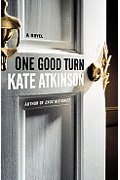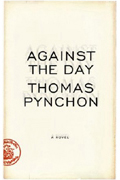
The Morning News Tournament of Books, sponsored by Powell’s Books, is an annual battle royale amongst the top novels in “literary fiction” published throughout the year. Read more about this year’s tournament »
» Buy the Books at Powells.com «
» Meet This Year’s Judges «
» Check the Bloggers’ Office Pool «
» Relive the Action: 2006, 2005 «
» Contact the Tournament Staff «
• SEMIFINALS • MATCH TWO •
March 27, 2007
 |
One Good Turnby KATE ATKINSON |

|
| v. | ||
Against the Dayby THOMAS PYNCHON |
judged by SASHA FRERE-JONES
I chose Atkinson out of the gate because I am never going to read a novel that is more than 1,000 pages long. A thousand? Sure—I’ve got lifetimes to throw away. But 1,001 is a dealbreaker.
This decision did not involve reading, but a decision to not read during a Tournament of Books seems like a bad precedent to set, especially for TMN’s younger subscribers. I went ahead and read the books. (I only got through 300 pages of Pynchon.)
The Atkinson is satisfying in the manner of a decent genre novel: Things happen, some of them unexpected, and the reader is rewarded for accepting a degree of predictability with the tacit promise that the story will not become stranded in the wilds of an ambitious but underconstructed conceit. In crime novels, specifically, people die, bad guys must be got, and we all go on pleasantly mysterious tangents. One Good Turn hews to the formula of the policier, and then veers above and below its baseline quality requirements. The characters in One Good Turn are unglamorous men and women between the ages of 35 and 60 caught in various stages of regret and disappointment. Among the many (too many) characters: a mystery writer who fears he’s a terminal wuss, an ex-policeman who can’t stop thinking like a policeman, a woman whose boorish husband turns out to be more boorish than she thought, and a single mother/policewoman whose teenage son likes to shoplift. They get tangled up in each other’s business when, in broad daylight on a crowded Edinburgh street, a bad person gives in to road rage and hits another bad person with a baseball bat. The wuss author witnesses this and throws his computer bag at the first bad man, which prevents him from killing the other bad man. This, understandably, enrages the first bad man and sets the story in motion.
Atkinson uses a trope best known to viewers of Lost: Unconnected characters turn out to have crossed paths and be connected. It is Frigyes Karinthy’s “six degrees of separation” meme rendered in narrative. Atkinson also uses the “slow reveal” method from Lost—these connections are not illuminated right away, and some stay hidden for more than half of the book. The problem here is that puzzles don’t produce much tension when they do not present themselves clearly and immediately as puzzles. If you’re not wondering about a loose thread, there is little satisfaction in its tying up. Too many characters are introduced too slowly and with too much background.
I don’t expect every crime novel to be as ruthlessly mobile and vernacular as J.J. Connolly’s Layer Cake, but that book isn’t a bad template for the genre. You want to want to read a crime novel in a single sitting, and I didn’t, though I enjoy Atkinson’s knack for writing pitiful, glum inventories of lives in decline. The best bits of One Good Turn are the character sketches that retard the narrative, a bind. I would rather have read either a more obvious but emotionally resonant novel about middle-aged couples in Edinburgh, or an efficient, less-peopled crime boiler with a single first-person narrator. As I say to my kids: Choose one, just one. Atkinson gets points for setting the novel in the middle of Edinburgh’s Fringe festival; points off, though, for taking shots at the barreled fish of avant-garde theater.
As for Pynchon, there is no number too high for him, whether it’s the number of characters, historical issues, funny names, or pages. I appreciate the rhythm of his sentences, many of which make otherwise clotted pages glow. But that hammering quality I’ve always disliked in Pynchon’s prose hasn’t changed. It’s the Columbine teen in him, the voice saying, “Everyone is a philistine! Nobody understands REAL writing!” and urging him on to all his drastic signification and tortured plotting. I take no pleasure in being defeated by Pynchon, and I don’t think he’s full of hot air; I just think we have very different pleasure principles. I defer here to Luc Sante’s generous review in the New York Review of Books, which allows the book its many conceits and finds the value in them. My own limits (the Russians, for instance, have always had too many goddamn characters with too many names for my taste) may be preventing me from properly juicing this enormous book. I would not give either of these books as gifts.
• About the Judge •
• From the Booth •
| Genre is not the short bus untalented writers take to publishing school. Every book in this competition belongs to a genre with its own set of clichés. | Kevin | John | Infinite Jest: OK, I skipped some of the footnotes, but I totally read everything else, I swear. |
» Read Kevin Guilfoile & John Warner’s commentary on the match «

» DOWNLOAD THE BRACKETS «
• Round One •
Half of a Yellow Sun v. Absurdistan
judged by Brady Udall
The Echo Maker v. The Emperor’s Children
judged by Marcus Sakey
Firmin v. Brookland
judged by Sarah Hepola
The Second Coming of Mavala Shikongo v. The Road
judged by Maria Schneider
Arthur and George v. One Good Turn
judged by Kate Schlegel
The Lay of the Land v. English, August
judged by Colin Meloy
Alentejo Blue v. Apex Hides the Hurt
judged by Dan Chaon
Against the Day v. Pride of Baghdad
judged by Anthony Doerr
• Round Two •
Half of a Yellow Sun v. The Emperor’s Children
judged by Jessa Crispin
Firmin v. The Road
judged by Mark Sarvas
One Good Turn v. The Lay of the Land
judged by Maud Newton
Alentejo Blue v. Against the Day
judged by Sam Lipsyte
• SEMIFINALS •
Half of a Yellow Sun v. The Road
judged by Elizabeth Gaffney
One Good Turn v. Against the Day
judged by Sasha Frere-Jones
• ZOMBIE ROUND •
The Road v. Against the Day
judged by Andrew Womack
One Good Turn v. Absurdistan
judged by Rosecrans Baldwin

